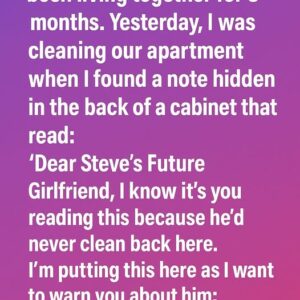The first cold edge of October hung over Willow Creek, the kind of small Ohio town where nights usually pass without incident. At 2:47 a.m., the flicker of a gas station sign pulsed across an empty lot while Officer Daniel Morris stared into a cup of lukewarm coffee and tried not to count the minutes until dawn. He heard it before he saw her—a thin, high-pitched cry that didn’t belong to the wind. Then it came again, closer, desperate. “Help! Please, help!”
He threw his door open. A little girl burst out of the dark, barefoot, pajama pants muddied to the knees, hair stuck to her cheeks with tears and sweat. She couldn’t have been more than eight. “Hey,” Daniel said, softer than he felt. “You’re safe. I’ve got you.” His partner, Officer Jenna Reyes, was already on the radio, voice clipped and calm, calling for EMTs. The child gulped air and managed, “Please come—my mom won’t wake up.”
“What’s your name?” Daniel asked, crouching to her height.
“Emma,” she choked. “She’s on the kitchen floor. There was blood. She won’t talk to me.”
“Okay, Emma,” he said, opening the back door. “Show us where.”
They were moving before the sirens wound up, Jenna punching an address into the onboard GPS, Emma clutching a one-eared stuffed rabbit like a lifeline. “Did someone hurt your mom?” Jenna asked gently. Emma stared at her knees. “Kyle was there. They were fighting. She told me to go to my room. I heard a bang. This morning she wouldn’t wake up.”
Daniel’s knuckles went white on the wheel. “Dispatch, possible domestic turned fatal. Send backup to Birchwood Lane.”
The house was three minutes from the gas station and felt a mile past safe. The porch light flickered. The front door sat crooked, ajar. Daniel pushed it with the heel of his hand and the stale air gave them the first truth: the sharp metallic tang no cop mistakes. The kitchen had been a battleground—a chair snapped, glass glittering on tile, a streak where something heavy had been dragged. A woman lay on the floor, hair matted to her cheek, skin gone the color that has only one meaning.
“Pulse,” Daniel said, though he already knew. Jenna’s fingers found a neck that would not give. She looked up and shook once. “She’s gone.”
A small sound rose behind them. Emma was in the doorway, rabbit pressed to her mouth. “Mommy?”
Daniel moved fast, blocking her view with his body. “Sweetheart,” he said, “we’re here now. You did the bravest thing you could by coming to get help. I’m so sorry.”
“Kyle,” she whispered. “He said Mommy can’t take me away.”
By dawn the quiet street pulsed with activity. Crime scene tape snapped in the wind. Neighbors stood behind curtains and texted. Forensics moved with soft speed, bagging a broken frame, swabbing spatter, photographing the gun that had been placed carefully at arm’s reach. Detective Laura Stevens arrived in a slate coat and a mind like a vise. She walked the rooms slowly, absorbing the language of the house. No sign of forced entry. Two coffee cups on the kitchen table, one with a fresh lipstick crescent. The victim’s right-handed; the wound left-sided. The gun wiped clean of prints—except for the victim’s.
“Staged,” Laura said quietly. “This is theater.”
“Who found her?” she asked without looking away from the scene. “Her daughter,” Daniel said. “Ran barefoot to the Speedway.”
“Brave kid,” Laura murmured, then crouched by the body and traced the air an inch above the bruises. They didn’t match a fall. They matched fingers, applied after death. “He moved her,” she said. “He wanted us to read the wrong story.”
Emma sat in the back of the patrol car wrapped in a blanket, little hands tight around a Styrofoam cup of cocoa. Laura approached like she had all the time in the world. “Hi, Emma. I’m Laura. I’m going to ask you a few questions so we can help, okay?” Emma nodded, eyes huge. “Did your mom and Kyle fight last night?” “Yes,” Emma whispered. “Mom said we were going to leave. He said she couldn’t. He said she belonged to him. He went to the garage. I heard a bang. I hid under my bed.” Laura’s throat tightened. “You did exactly the right thing.”
Inside, evidence pulled into focus. There were Kyle Anderson’s fingerprints on doorknobs and mugs—enough to prove presence, not enough to touch the gun. No pry marks on windows. No missing electronics. A neighbor knocked with a shaky hand and a tidbit that mattered: “I heard shouting just past midnight. Then a blue Ford peeled out. I’ve seen that man. The one she told you about. Kyle.”
A BOLO went out across three counties: Kyle Anderson, 35, blue Ford pickup, Ohio plates. While they waited, the coroner confirmed the bruises were postmortem and that blood spatter patterns didn’t match a self-inflicted shot. Under the victim’s nails, a prize: skin cells. The lab called before noon. “DNA match to Anderson.”
Two days later, a clerk at a roadside motel twenty miles south recognized the plate. Laura took a SWAT stack at dawn. When the door blew, a man launched through the bathroom and into the alley, half-dressed, terror and arrogance battling in his eyes. Daniel took him down in mud and handcuffed him while he shouted, “She did it to herself! She was crazy!”
In the room: a duffel of keepsakes that didn’t belong to him—Emma’s baby photos, a birth certificate, a wedding ring polished by a thumb that had no right to touch it. Not souvenirs. Possession.
In interrogation, Kyle slouched into rage and back again. Laura slid photos across the table—the kitchen, the bruises, the mug, the little rabbit left on the sofa like a witness. “Why run?” she asked evenly. “If she shot herself, why not call us?” He laughed until it sounded like a cough. “Because you people don’t listen when a man tells you the truth.” “Then tell the truth,” Laura said. “Your skin is under her nails. The gun is wiped. The scene is staged. She was going to leave you and you decided she didn’t get to decide that.” He stared at the wall, jaw pulsing. “She made me crazy,” he finally said. “I didn’t mean—” Laura didn’t let him have the exit. “You stayed. You made coffee. You arranged her. That’s not ‘snapped.’ That’s a plan.”
He didn’t speak again.
The prosecutor barely had to raise his voice. The evidence was precise and unkind. Emma’s recorded statement played in a courtroom that went very quiet. The neighbor’s testimony put a truck on the road when the kitchen clock stopped. Forensics translated blood into a timeline. A jury returned in under two hours. Life without parole.
Emma didn’t testify. She sat cross-legged on a foster family’s carpet drawing rabbits while the verdict scrolled across the television. When the anchor said “guilty,” she touched the rabbit’s ear and said, not to the room but to someone who wasn’t there, “Mommy can rest now.”
A few days later Laura drove out to see her. The foster home was small and warm, the fridge papered with crayon sunbursts and lopsided houses. Emma was at the window, coloring the sky improbably green. “Hi, Detective,” she said, shy but steady. “Is Mommy okay now?” Laura knelt, feeling that pinch behind the sternum she never admits to. “Your mom is safe, sweetheart. And she is so proud of what you did.” Emma considered this with the gravity only children have. “I just didn’t want her to be alone,” she said. “She won’t be,” Laura answered. “Not while you remember.”
On Birchwood Lane the porch light still flickered, a stubborn bulb that someone would eventually replace. The tape came down. The house would sell or it wouldn’t. Neighbors would talk and then stop. But some things stay. A little girl ran barefoot through the dark because courage is sometimes just movement toward help. Two patrol officers did their jobs with open eyes. A detective read a room and refused the easy story. The system, flawed as it is, worked the way it’s supposed to one exact time.
Daniel keeps a copy of the call slip in his desk, a reminder of the night the quiet town wasn’t. Jenna drives past the Speedway on late shifts and checks the shadows without knowing why. Laura files the case and starts another because there is always another, but she stays a moment longer in her car before going home, hands loose on the wheel, watching the wind push leaves across the pavement. There’s no ribbon big enough for a story like this. There’s only the fact that truth will find air when someone makes a door for it.
Somewhere in a tidy kitchen, a foster mom turns on the light and asks if anyone wants pancakes. Emma holds her rabbit and nods. Outside, the town exhales and gets on with morning. And in the quiet between sirens and breakfast, it’s possible to believe that, even in the darkest hours, someone will run toward the call and someone else will open the door.


